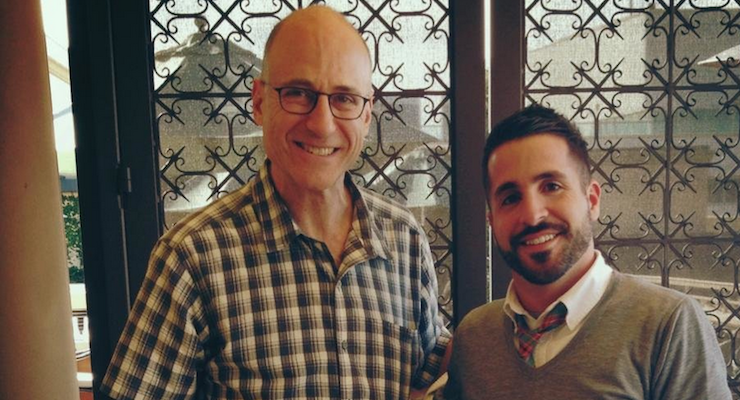

Donald P. Green, left, a co-author of a challenged study by Michael LaCour, right, from Mr. LaCour’s Facebook page.
Recent revelations indicate that Science, one of the world’s leading scientific journals, published a completely fabricated study on gay marriage in December. Now, following reports from The Wall Street Journal, The New York Times and The Washington Post, one of the study’s co-authors has asked the journal to retract the publication.
Michael LaCour, a political science researcher at the University of California, Los Angeles, was hoping to kill two birds with one stone in 2012. Following the defeat of California’s Proposition 8 at the ballot box, LaCour thought he could help build support for gay marriage under the pretext of conducting a study that asked if canvassers who had a personal stake in an issue — in this case, gay men and women — could sway voters’ opinions in conservative areas of the state?
But, as the study demonstrates, the real question people are asking now is whether the leftist-dominated world of academia is even trustworthy, honest and impartial enough to conduct such “scientific” experiments.
“I thought it was a very ambitious idea, so ambitious that it might not be suitable for a graduate student,” said Donald P. Green, a Columbia University professor who signed on as a co-author of Mr. LaCour’s study in 2013. “But it’s such an important question, and he was very passionate about it.”
On Tuesday, however, Dr. Green asked Science to retract the study, citing Mr. LaCour’s inability to produce the study’s raw data to be scrutinized. It seems Mr. LaCour claims that he erased the study’s raw data.
“Given the negative publicity that has now surrounded this paper and the concerns that have been raised about its irreproducibility, I think it would be in Michael LaCour’s best interest to agree to a retraction of the paper as swiftly as possible,” Marcia McNutt, editor in chief of Science said Friday. “Right now he’s going to have such a black cloud over his head that it’s going to haunt him for the rest of his days.”
Dr. Green is understandably trying to salvage his own reputation, but to his credit, he did doubt the studies findings several times. Unfortunately, perhaps because of his biases, his push-back on the shocking findings never moved beyond light questioning.
LaCour claims the study canvassed neighborhoods where same-sex marriage performed poorly at the ballot box, including Boyle Heights, South Central and East Los Angeles. The voters, allegedly, were randomly assigned to gay and straight canvassers, who were equally trained to strike up conversations with them.
He also claimed to have tracked voters’ attitudes toward same-sex marriage over a period of nine months, using a survey tool called the “feeling thermometer.” But LaCour’s findings reported a response rate of the participants who completed surveys at 12 percent, which was so high that it raised red flags with Dr. Green, who insisted the work be repeated.
LaCour told Dr. Green that the response rate was so high because he paid the participants, but in reality, he didn’t. Regardless, after he came back to Green with similar results the second time around, the doctor ended his inquiry and signed on as a co-author.
“Michael said he had hundreds of thousands in grant money, and, yes, in retrospect, I could have asked about that,” Dr. Green told The New York Times. “But it’s a delicate matter to ask another scholar the exact method through which they’re paying for their work.”
It wasn’t until David Broockman, a future assistant professor at Stanford, decided to test the same method on the issue of transgender equality in Florida that the fraud surfaced. Dr. Broockman, along with Joshua Kalla, a Ph.D. candidate at the University of California, Berkeley, paid participants as they thought Mr. LaCour had. However, their response rate was just 3 percent.
“We started to wonder, ‘What are we doing wrong?’ ” Mr. Kalla said. “Our response rate was so low, compared to his.”
Mr. LaCour, who now claims to have offered an i-Pad as incentive rather than money, declined to be interviewed. But, he has said through a lawyer statement that he still stands by the study’s findings. That’s not surprising, considering he banked his entire academic and professional future on the fabricated study.
LaCour posted on his Facebook page three months ago that he would soon be moving across country for his “dream job” as a professor at Princeton. However, no official offer has been made, according to the university, who is now looking into the matter.
“We will review all available information and determine the next steps,” Princeton spokesman, Martin Mbugua, said.







